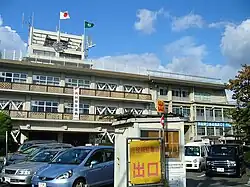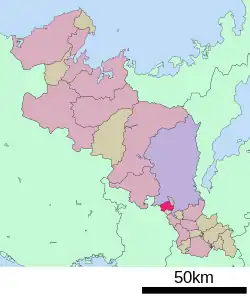Nagaokakyō
長岡京市 | |
|---|---|
 Nagaokakyō City Hall | |
 Flag  Seal | |
Location of Nagaokakyō in Kyoto Prefecture | |
 | |
 Nagaokakyō Location in Japan | |
| Coordinates: 34°55′37″N 135°41′45″E / 34.92694°N 135.69583°E | |
| Country | Japan |
| Region | Kansai |
| Prefecture | Kyoto |
| Government | |
| • Mayor | Kengo Nakakoji (since January 2015) |
| Area | |
| • Total | 19.17 km2 (7.40 sq mi) |
| Population (September 1, 2023) | |
| • Total | 82,279 |
| • Density | 4,300/km2 (11,000/sq mi) |
| Time zone | UTC+09:00 (JST) |
| City hall address | 1-1-1 Kaida, Nagaokakyō-shi, Kyoto-fu 617-8501 |
| Website | Official website |
| Symbols | |
| Bird | Japanese white-eye |
| Flower | Ericaceae |
| Tree | Maple |


Nagaokakyō (長岡京市, Nagaokakyō-shi) is a city located in Kyoto Prefecture, Japan. As of 1 September 2023, the city has an estimated population of 82,279 in 37718 households and a population density of 4700 persons per km².[1] The total area of the city is 19.17 square kilometres (7.40 sq mi).
Geography
Nagaokakyō is located in southwestern Kyoto Prefecture. The Obata River and Koizumi River flow through the city. The topography is low from the northwest to the southwest. The area is noted for its bamboo forests.
Neighboring municipalities
Climate
Nagaokakyō has a humid subtropical climate (Köppen Cfa) characterized by warm summers and cool winters with light to no snowfall. The average annual temperature in Nagaokakyō is 14.5 °C. The average annual rainfall is 1677 mm with September as the wettest month. The temperatures are highest on average in August, at around 26.5 °C, and lowest in January, at around 3.1 °C.[2]
Demographics
Per Japanese census data,[3] the population of Nagaokakyō has increased slightly in recent decades.
| Year | Pop. | ±% |
|---|---|---|
| 1940 | 8,090 | — |
| 1950 | 10,614 | +31.2% |
| 1960 | 15,050 | +41.8% |
| 1970 | 51,414 | +241.6% |
| 1980 | 71,445 | +39.0% |
| 1990 | 77,191 | +8.0% |
| 2000 | 77,846 | +0.8% |
| 2010 | 79,850 | +2.6% |
| 2020 | 80,608 | +0.9% |
History
The area of Nagaokakyō was part of ancient Yamashiro Province. The legendary Kofun period Emperor Keitai's Prince Otokuni, constructed a palace in this location in 518 AD. In 784 AD, Emperor Kammu transferred the capital of Japan from Heijō-kyō to the Nagaoka-kyō Palace; however, the palace was not actually located in modern Nagaokakyō, but in the adjacent city of Mukō .
The villages of Otokuni, Kaiin-ji and Shinkotari in Otokuni District, Kyoto were established on April 1, 1889 with the creation of the modern municipalities system. These villages merged on April 1, 1949 to form the town of Nagaoka, which was elevated to city status on October 1, 1972, taking the name of Nagaoka-kyō.
Government
Nagaokakyō has a mayor-council form of government with a directly elected mayor and a unicameral city council of 22 members. Nagaokakyō, collectively with Ōyamazaki contributes two members to the Kyoto Prefectural Assembly. In terms of national politics, the city is part of the Kyoto 3rd district of the lower house of the Diet of Japan.
Economy
Nagaokakyō has a mixed economy based on commerce and light manufacturing. Murata Manufacturing and Mitsubishi Logisnext are based in Nagaokakyō. Theb city si also a commuter town for the neighboring cities of Kyoto and Osaka.
Education
Nagaokakyō has ten public elementary schools and four public junior high schools operated by city government and two public high schools operated by the Kyoto Prefectural Board of Education. There is also one private junior high school and one private high school. The prefecture also operates one special education school for the handicapped. The Kyoto Seizan College is a private junior college located in Nagaokakyō.
Transportation
Railways
Highways
Sister city relations
 Arlington, MA, United States, sister city since 1984
Arlington, MA, United States, sister city since 1984 Ningbo], Zhejiang, friendship city since 1983
Ningbo], Zhejiang, friendship city since 1983
Local attractions
- Shōryūji Castle
- Igenoyama Kofun, National Historic Site
Culture
The most popular event in Nagaokakyo is the Garasha Festival, usually held in November, in honor Hosokawa Gracia. The Garasha Festival is held at both the Nagaokakyo Cultural Center and Shoryuji Castle, while the parade runs throughout the city. Many of the parade participants wear various period's traditional clothing, including the chosen 'Garasha' of the year.[4]
Notable people from Nagaokakyō
- Kenjiro Yamashita, member of J-pop boygroups Exile and Sandaime J Soul Brothers and a former member of Gekidan Exile.
- Shohei Yamamoto, former soccer player
- Hiroshi Otsuki, former football player and manager
- Aya Shimokozuru, former soccer player (Japan women's national football team)
- Takashi Usami, soccer player (Gamba Osaka, J1 League)
- Miho Takahashi, swimmer
- Masaaki Sakata, former rugby union player
- Ayumi Kaihori, former soccer player (Japan women's national football team)
See also
References
- ↑ "Nagaokakyō City official statistics" (in Japanese). Japan.
- ↑ Nagaokakyō climate: Average Temperature, weather by month
- ↑ Nagaokakyō population statistics
- ↑ "京都・長岡京市 ガラシャの魂息づく". 日本経済新聞 (in Japanese). January 22, 2011.
External links
 Media related to Nagaokakyō, Kyoto at Wikimedia Commons
Media related to Nagaokakyō, Kyoto at Wikimedia Commons- Nagaokakyō City official website
- Past Exhibitions – National Museum of Japanese History